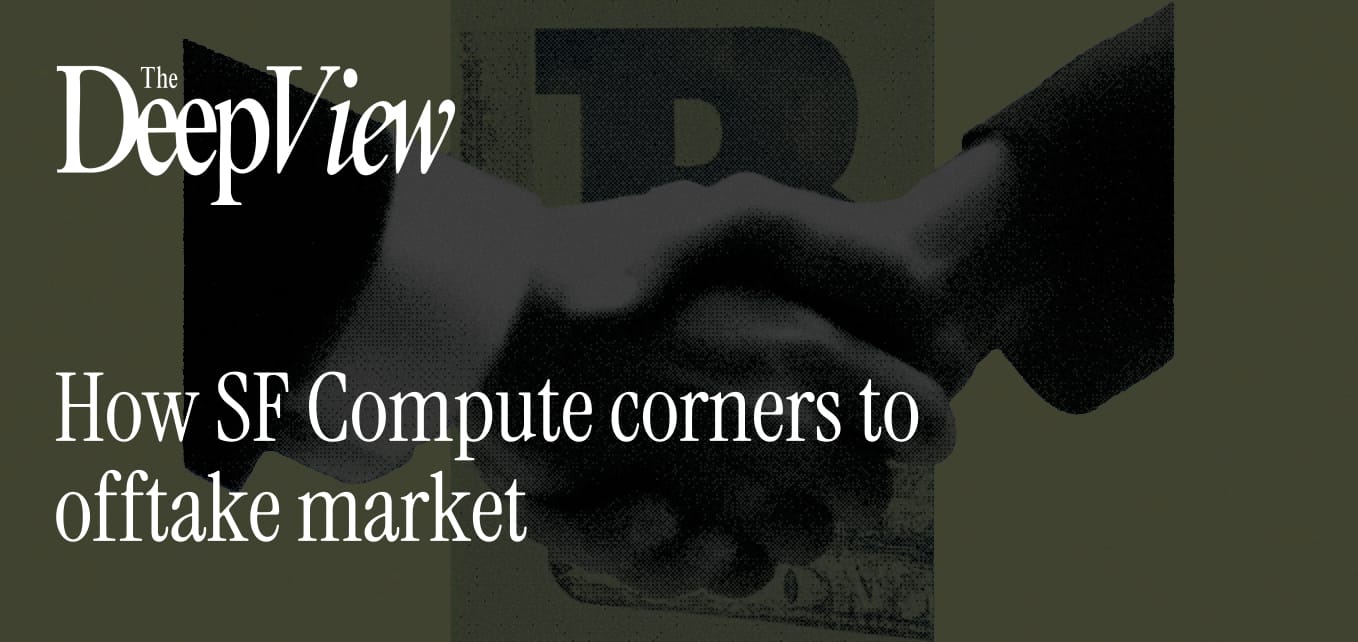- The Deep View
- Posts
- How SF Compute corners to offtake market
How SF Compute corners to offtake market

Welcome back. OpenAI and Anthropic top the charts on what tools enterprises are actually willing to pay for, according to a report by Andreessen Horowitz released Thursday. By analyzing spending data from more than 200,000 customers from enterprise fintech company Mercury, the firm was able to identify the top 50 AI-native application layer companies. “Horizontal” apps, which focus on boosting overall productivity, made up 60% of the list, while niche, “vertical” apps made up 40%. Some standouts include Cursor at No. 6, Perplexity at No. 12 and Midjourney at No. 28.
1. How SF Compute corners to offtake market
2. Perplexity makes AI browser free
3. OpenAI is now the most valuable private company
STARTUPS
How SF Compute corners to offtake market

It pays to be the middleman.
At least that’s what Evan Conrad, CEO of The San Francisco Compute Company, better known as SF Compute, has found to be true. The startup, which helps GPU cluster vendors secure “offtake,” claims it has experienced rapid growth as AI developers clamber for more compute without wanting to get locked into expensive, long-term contracts.
So how does it work? To put it simply, Conrad said, if you go to get a loan to fund a GPU cluster, the lender needs to know that the organizations you’re selling that cluster to will be able to pay for it. This creates a market where GPU vendors want to lock customers into lengthy contracts, also known as offtake.
That’s where SF Compute comes in, said Conrad. The company secures offtake for those vendors by sourcing customers for GPU clusters, allowing those customers to “buy long contracts, and … sell back portions of it.” Every time someone sells that compute, Conrad’s firm takes a fee.
“Something like a trillion dollars is flowing into compute,” said Conrad. “And if you don't have secure offtake, that means there's a bubble.”
SF Compute was born out of necessity, Conrad said, having been “backed into it” while searching for short-term compute for a previous AI startup he was creating. Unable to find ways to rent the power he needed in the short term, his then-company purchased a GPU cluster, using what they needed and “subleasing” the rest of the resources, he said.
According to Conrad, SF Compute has struck a chord among AI developers, claiming that the company’s revenue has grown 13 times the size it was in July. Though Conrad was close-lipped about customers, he noted that “people are spending on the order of millions of dollars a month.”
“There is more money than has ever been deployed into any infrastructure project in the history of the world, flowing into compute at the moment,” Conrad noted.

Compute is more valuable now than ever – and traditional cloud offerings may not be cutting it. The search for a solution is evident in the growing popularity of neoclouds, such as Nebius, CoreWeave, Nscale and Lambda, which have, in total, inked more than $33 billion in deals with Microsoft. But as the costs of compute grow higher and higher, SF Compute’s success could signal a desire among smaller AI labs for more affordable alternatives.
TOGETHER WITH HUBSPOT
Discover your next AI-powered teammate on the HubSpot Marketplace
Your perfect solution is waiting!
Through intelligent recommendations, the HubSpot Marketplace makes it easy to find apps, services, all-new Breeze agents, and more.
Search by outcome, discover trending tools, and accelerate your growth on HubSpot.
PRODUCTS
Perplexity makes AI browser free

Perplexity is aggressively pursuing Google’s turf.
On Thursday, the AI search startup launched the free version of its Comet browser, which was previously available only as part of its $200-per-month “Max” plan. Since Comet’s release in July, the company claims its waitlist has amassed “millions” of users.
“It has become the most sought-after AI product of the year, no matter how fast we release invites,” Perplexity said in its announcement.
Along with opening Comet up to the general public, Perplexity announced several other launches:
“Background assistants” for Max plan holders, which work simultaneously and asynchronously “in your browser, your inbox, or the background,” seemingly an extension of the launch of its email assistant last week, which learns your communication style, prioritizes messages and drafts replies.
A Comet Plus subscription option, which provides an AI-powered news feed for $5 per month. This launch came alongside the announcement of several media partnerships, including The Los Angeles Times, The Washington Post and Conde Nast.
It’s hard to do one good product. It’s even harder to do two. We hope to grow both these to billion users and continue to create new ones.
— Aravind Srinivas (@AravSrinivas)
6:48 PM • Oct 2, 2025
This move stands to benefit Perplexity in several ways. For one, making its browser more accessible can help it gain ground against Google’s market stronghold, especially following the company’s antitrust win that allowed it to keep control of Chrome (Google’s share price dipped following the announcement).
Additionally, forging partnerships with media companies could be a way to ward off further copyright lawsuits, as the legal battle with News Corp, which owns the Wall Street Journal, the New York Post, MarketWatch, and more, continues.
However, even a free browser comes at a price. Perplexity's tight data tracking could enable it to sell highly personalized ads, which CEO Aravind Srinivas said on a podcast in April was the motivation for building a browser in the first place. With a broader audience, that ad potential becomes all the more valuable.
TOGETHER WITH PIQUE
Hydrated Skin. Deeper Sleep. One Smart Ritual
Most hydration solutions stop at water and electrolytes — but Pique’s Deep Hydration Protocol is a 2-product system designed to work around the clock, delivering results you can see and feel.
☀️ B·T Fountain (Day): A precise blend of clinically proven ceramides, hyaluronic acid, and trace minerals to deeply hydrate, plump skin, and sustain energy throughout the day.
🌙 R·E Fountain (Night): Triple Biomaxed™ Magnesium with real lemon to calm the nervous system, promote restorative sleep, and support overnight recovery.
✨ Our readers rave about Pique’s Deep Hydration Protocol not only because it goes beyond hydration, but also because of the unmatched quality of Pique’s products and their science-backed solutions for skin, immunity, hydration, gut health, and more. With just two products, it’s an elegantly simple, data-driven ritual that integrates effortlessly into daily life and delivers visible, lasting results.
VALUATIONS
OpenAI is now the most valuable private company

Move over, SpaceX. On Thursday, OpenAI took the top spot as the world’s most valuable private company.
The title followed news that the company completed a $6.6 billion secondary share sale, which allowed employees to sell stock at a $500 billion valuation, according to Bloomberg. The stock was sold to a bevy of investors, including Thrive Capital, SoftBank, Dragoneer Investment Group, Abu Dhabi’s MGX and T. Rowe Price.
Although employees were reportedly authorized to sell in excess of $10 billion, not hitting that mark may be a sign that employees are confident in the company’s growth trajectory.
The deal nudges Elon Musk-owned SpaceX out of the top startup throne, which is currently valued at $400 billion. OpenAI was previously valued at $300 billion after a $40 billion funding round in March, marking the largest funding round ever raised by a tech company.
The news adds more fuel to the ever-growing OpenAI fire, and might call into question just how much substance there is to these sky-high valuations. Fears of an AI bubble have begun to emerge as investments and valuations continue to add zeros, with even OpenAI CEO Sam Altman casting doubt on the hype. Meta CEO Mark Zuckerberg joined in on this sentiment, claiming a collapse was “definitely a possibility” based on previous infrastructure buildouts leading to bubbles.
However, one industry figurehead is doubling down: Jensen Huang. In a podcast appearance earlier this week, the Nvidia CEO said OpenAI is “very likely going to be the world’s next multitrillion-dollar hyperscale company,” just days after the chip giant announced a $100 billion investment in OpenAI.
LINKS

Meta launches Business AI a digital assistant for retailers
Current AI models won’t make novel scientific discoveries, Hugging Face cofounder said
OpenAI Sora app hits No. 3 in the U.S. App Store, despite being invite-only
AI observability startup Dash0 raises $35 million in Series A
Microsoft team uses AI to discover “zero day” vulnerabilities in biology
Former Stripe CTO Rahul Patil joins Anthropic to focus on infrastructure
DualEntry raises a $90M Series A from Lightspeed as it emerges from stealth

Sora 2: The latest generation of OpenAI’s video model, offering more physically accurate and realistic videos with more control.
Claude in Slack: Anthropic has launched two new ways to add its model into Slack, by either connecting Claude directly to your Slack workspace or integrating Claude apps.
Gemini 2.5 Flash Image: Google’s image model is now generally available, now featuring more aspect ratios and the ability to specify image-only outputs.
Mosaic: An agentic AI video editing tool for ideating, iterating and publishing content, now available in beta.
Mem 2.0: An AI “thought partner” that captures and resurfaces ideas via its notes app.
Instruct:A no-code automation platform for building, editing and deploying AI agents.

Staff ML platform engineer with 10 years building data pipelines and feature stores, 5 years leading large scale ranking and recommendations. Stack: AWS, Kafka, Spark, Databricks, Feast. $48/h
Computer vision and MLOps engineer with 7 years shipping models to production, 3 years deploying on secure edge devices for industrial QA and IoT. Stack: PyTorch, TensorRT, OpenVINO, CUDA, ONNX, Azure IoT. $52/h
NLP architect with 9 years designing compliance ready language systems for finance and healthcare, 4 years on multilingual chatbots and document automation with RAG. Stack: Hugging Face, spaCy, FastAPI, Postgres, LangChain. $45/h
(Sponsored)
POLL RESULTS
Will this change how you use Meta AI?
I'll stop using it entirely (15%)
I'll be more careful about what I discuss (19%)
Won't change my behavior (19%)
I don't use Meta AI (27%)
I already avoid Meta products (20%)
The Deep View is written by Nat Rubio-Licht, Faris Kojok and The Deep View crew. Please reply with any feedback.
Thanks for reading today’s edition of The Deep View! We’ll see you in the next one.

“What is that in [the other image]? It's half horse half bull!” “As unlikely as it is for a cowboy to be riding a bison, if you've ever seen a bison before, you know their hindquarters don't look like [the other image]. Not even close.” “Lighting on the face of the cowboy was a quick give away” |
 | “People ride bison?” “The clouds looked more authentic in this one.” “The Buffalo being ridden by a cowboy just falls into the realm of impossible” |

Take The Deep View with you on the go! We’ve got exclusive, in-depth interviews for you on The Deep View: Conversations podcast every Tuesday morning.

If you want to get in front of an audience of 450,000+ developers, business leaders and tech enthusiasts, get in touch with us here.





